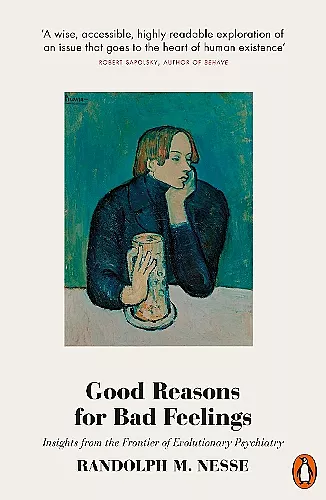Good Reasons for Bad Feelings
Insights from the Frontier of Evolutionary Psychiatry
Format:Paperback
Publisher:Penguin Books Ltd
Published:6th Feb '20
Should be back in stock very soon

A founder of the field of evolutionary medicine uses his decades of experience as a psychiatrist to provide a much-needed new framework for making sense of mental illness.
'A new approach to mental disorder. Randolph Nesse's insightful book suggests that conditions such as anxiety and depression have a clear evolutionary purpose ... This intriguing book turns some age-old questions about the human condition upside down' Tim Adams, Observer
One of the world's most respected psychiatrists provides a much-needed new evolutionary framework for making sense of mental illness
With his classic book Why We Get Sick, Randolph Nesse established the field of evolutionary medicine. Now he returns with a book that transforms our understanding of mental disorders by exploring a fundamentally new question. Instead of asking why certain people suffer from mental illness, Nesse asks why natural selection has left us with fragile minds at all.
Drawing on revealing stories from his own clinical practice and insights from evolutionary biology, Nesse shows how negative emotions are useful in certain situations, yet can become excessive. Anxiety protects us from harm in the face of danger, but false alarms are inevitable. Low mood prevents us from wasting effort in pursuit of unreachable goals, but it often escalates into pathological depression. Other mental disorders, such as addiction and anorexia, result from the mismatch between modern environments and our ancient human past. Taken together, these insights and many more help to explain the pervasiveness of human suffering, and show us new paths for relieving it.
Good Reasons for Bad Feelings will fascinate anyone who wonders how our minds can be so powerful, yet so fragile, and how love and goodness came to exist in organisms shaped to maximize Darwinian fitness.
Nesse's book offers fresh thinking in a field that has come to feel stagnant * The Financial Times *
A compelling case for locating mental illness within an evolutionary frame-work . . . an excellent and timely account of the history, development andimplications of evolutionary psychiatry. -- Frank Tallis * The Evening Standard *
This is a wise, accessible, highly readable exploration of an issue that goes to the heart of human existence. -- Robert M. Sapolsky, author of Behave
This intriguing book turns some age-old questions about the human condition upside down . . . In an engaging, storytelling voice that rests on 30 years of clinical practice, he offers a series of insights. * The Observer *
Insights that radically reframe psychiatric conditions ... As Good Reasons for Bad Feelings boldly posits, many of the core dysfunctional components of mental illness ultimately help to make us human. -- Adrian Woolfson * Nature *
Using [...] fascinating insights, Nesse suggests novel and revolutionary ways to treat mental illness. * The Daily Mail *
[Nesse's] basic conception of the mind feels like good, common sense. * The Sunday Times *
All psychiatrists and patients who find themselves having occasional "bad feelings" about our current understanding of mental illness will have many "good reasons" to consult this book. I do fully expect that someday nearly all psychiatry will be identified as evolutionary psychiatry. If so, Randolph Nesse's book should be seen as the field's founding document. -- David P. Barash * The Wall Street Journal *
Highly accessible, scholarly and deeply illuminating . . . this will become a treasured classic; not just for clinicians but for all those interested in how to facilitate well-being and create more moral communities and societies. -- Professor Paul Gilbert OBE, author of Compassionate Mind, and Living like Crazy
Two sets of ideas inform this fine book: one, the cold-hearted logic of natural selection; the other, the practical wisdom of a compassionate psychiatrist. The tension is palpable. The result is riveting. -- Nicholas Humphrey, Emeritus Professor of Psychology, London School of Economics, author of Soul Dust
ISBN: 9780141984919
Dimensions: 198mm x 130mm x 21mm
Weight: 283g
384 pages